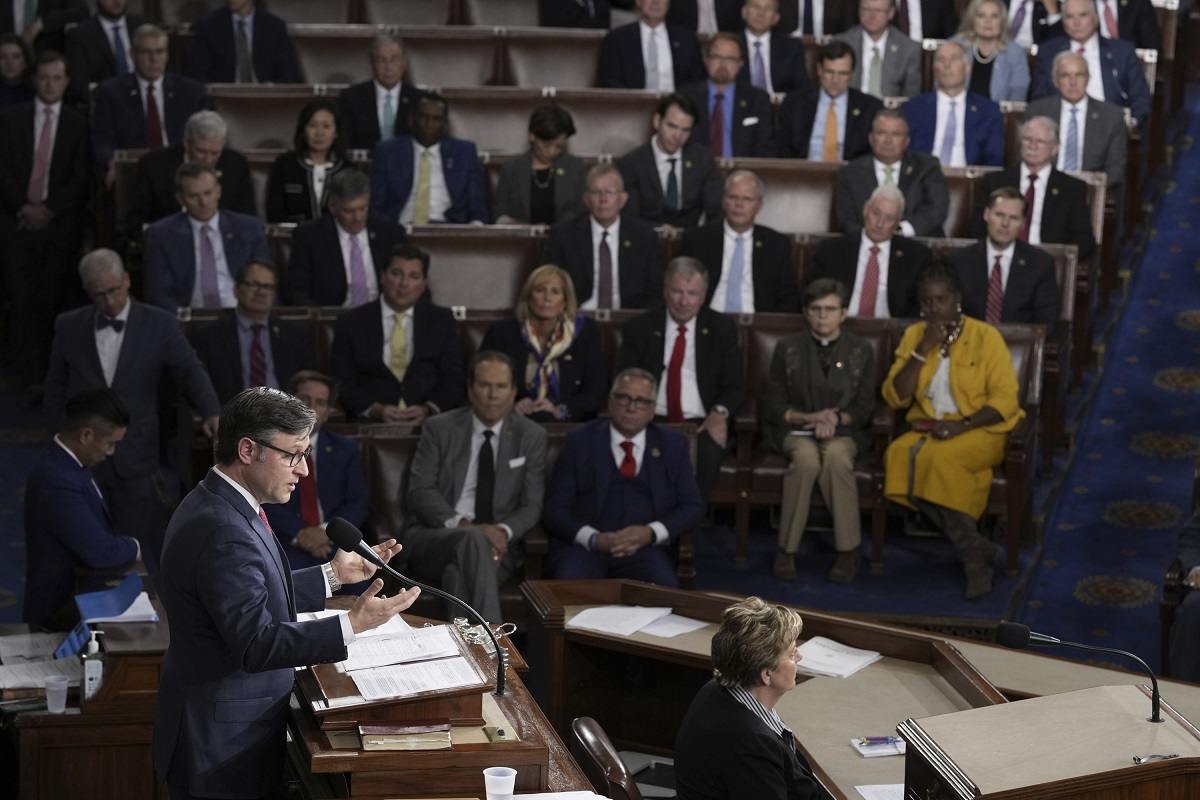Congressional Leaders Announce an Agreement on Spending Levels, a Key Step to Averting Shutdown

House Speaker-elect Rep. Mike Johnson, R-La., addresses members of Congress at the Capitol in Washington, Oct. 25, 2023.
12:38 JST, January 8, 2024
WASHINGTON (AP) — Congressional leaders have reached an agreement on overall spending levels for the current fiscal year that could help avoid a partial government shutdown later this month.
The agreement largely hews to spending caps for defense and domestic programs that Congress set as part of a bill to suspend the debt limit until 2025. But it does provide some concessions to House Republicans who viewed the spending restrictions in that agreement as insufficient.
In a letter to colleagues, House Speaker Mike Johnson said Sunday the agreement would secure $16 billion in additional spending cuts from the previous agreement brokered by then-Speaker Kevin McCarthy and President Joe Biden and is about $30 billion less than what the Senate was considering.
“This represents the most favorable budget agreement Republicans have achieved in over a decade,” Johnson writes.
Biden said the agreement “moves us one step closer to preventing a needless government shutdown and protecting important national priorities.”
“It reflects the funding levels that I negotiated with both parties and signed into law last spring,” Biden said in a statement. “It rejects deep cuts to programs hardworking families count on, and provides a path to passing full-year funding bills that deliver for the American people and are free of any extreme policies.”
The agreement speeds up the roughly $20 billion in cuts already agreed to for the Internal Revenue Service and rescinds about $6 billion in COVID relief money that had been approved but not yet spent, according to Johnson’s letter.
“It’s a good deal for Democrats and the country,” Senate Majority Leader Chuck Schumer told colleagues in a briefing call.
Essentially, Democrats see the trade-offs they made as mild. In a description provided to reporters, they said the COVID savings would have “no significant impact on any current projects or activities in motion.” And they said that moving all of the $20.2 billion in IRS cuts to this year instead of over two years would still leave the agency able to maintain “critical investments” that Congress provided in 2022. At the time, Congress provided the IRS with an additional $80 billion that could be spent over 10 years.
Overall, the agreement calls for $886 billion in defense funding. It would provide $772 billion in domestic, non-defense spending, when including $69 billion called for in a side deal to the debt ceiling bill that McCarthy had reached with the White House, Democrats said.
The most conservative House Republicans opposed the earlier debt ceiling agreement and even brought House proceedings to a halt for a few days to show their displeasure. Many were surely wanting additional concessions, but Democrats have been insistent on abiding by the debt ceiling agreement’s spending caps, leaving Johnson in a difficult spot.
“It’s even worse than we thought,” the House Freedom Caucus said of the agreement in a tweet posted on X. “This is total failure.”
Lawmakers needed an agreement on overall spending levels so that appropriators could write the bills that set line-by-line funding for agencies. Money is set to lapse Jan. 19 for some agencies and Feb. 2 for others.
The agreement is separate from the negotiations that are taking place to secure additional funding for Israel and Ukraine while also curbing restrictions on asylum claims at the U.S. border.
In a joint statement, Schumer and House Democratic leader Hakeem Jeffries voiced their support for the agreement.
“It will also allow us to keep the investments for hardworking American families secured by the legislative achievements of President Biden and Congressional Democrats,” Schumer and Jeffries said.
But they also warned House Republicans about trying to add conservative policy riders to the bills in the coming days, saying Democrats would not support “poison pill policy changes in any of the twelve appropriations bills put before the Congress.”
Rep. Patrick McHenry, who helped lead the debt ceiling negotiations when McCarthy was speaker, noted that two-thirds of both parties in the House supported that agreement.
“This deal, which adheres to that framework, deserves equally as robust support,” McHenry said.
Senate Republican leader Mitch McConnell, R-Ky., tweeted that he was encouraged that leaders identified a “path toward completing” the spending bills. It was a cautious recognition that some obstacles could lie ahead.
“America faces serious national security challenges, and Congress must act quickly to deliver the full-year resources this moment requires,” McConnell said.
"News Services" POPULAR ARTICLE
-

American Playwright Jeremy O. Harris Arrested in Japan on Alleged Drug Smuggling
-

Japan’s Nikkei Stock Average as JGB Yields, Yen Rise on Rate-Hike Bets
-

Japan’s Nikkei Stock Average Licks Wounds after Selloff Sparked by BOJ Hike Bets (UPDATE 1)
-

Japanese Bond Yields Zoom, Stocks Slide as Rate Hike Looms
-

Japan’s Nikkei Stock Average Buoyed by Stable Yen; SoftBank’s Slide Caps Gains (UPDATE 1)
JN ACCESS RANKING
-

Keidanren Chairman Yoshinobu Tsutsui Visits Kashiwazaki-Kariwa Nuclear Power Plant; Inspects New Emergency Safety System
-

Imports of Rare Earths from China Facing Delays, May Be Caused by Deterioration of Japan-China Relations
-

University of Tokyo Professor Discusses Japanese Economic Security in Interview Ahead of Forum
-

Japan Pulls out of Vietnam Nuclear Project, Complicating Hanoi’s Power Plans
-

Govt Aims to Expand NISA Program Lineup, Abolish Age Restriction



























